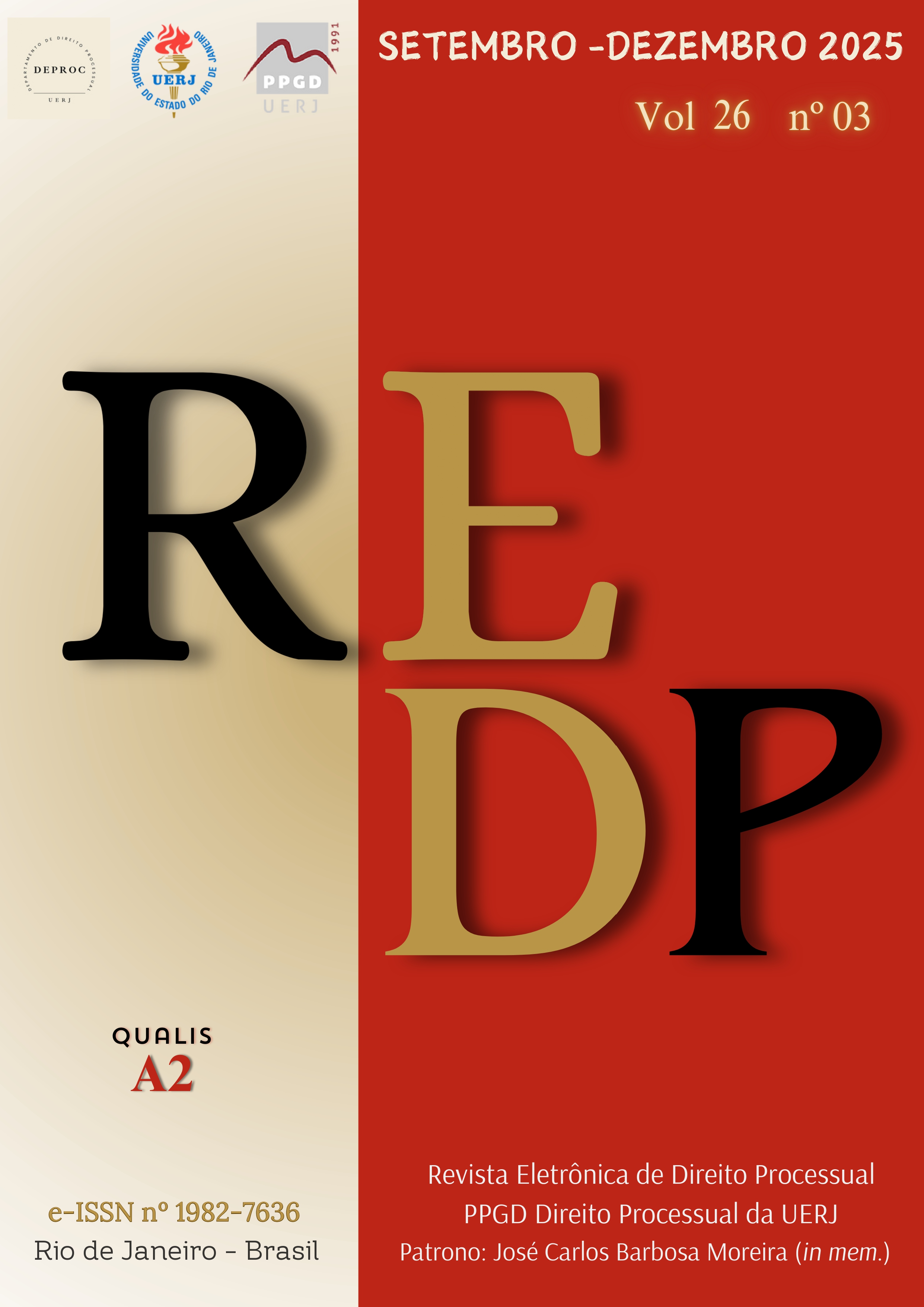A EFETIVIDADE DA AUDIÊNCIA PRELIMINAR DE CONCILIAÇÃO OU MEDIAÇÃO SOB A ÓTICA DOS JUÍZES
DOI:
https://doi.org/10.12957/redp.2025.80363Resumo
Resumo: O objetivo da presente pesquisa foi avaliar, a partir das construções doutrinárias e jurisprudenciais desenvolvidas sobre o tema, bem como das informações obtidas junto às serventias judiciais e aos sistemas processuais informatizados ao longo do ano de 2021, qual a percepção dos magistrados em atuação perante os órgãos não criminais do Fórum Regional de Jacarepaguá, integrante da Comarca da Capital do Poder Judiciário do Estado do Rio de Janeiro, sobre a realização da audiência preliminar de conciliação ou mediação prevista no artigo 334 do Código de Processo Civil. A proposta geral do estudo era demonstrar, ainda que dentro de um recorte muito restrito e específico, como as regras referentes à realização da referida audiência estavam sendo aplicadas para fazer uma comparação com a visão que os magistrados atuantes naquele campo pesquisado tinham sobre o assunto. Para tanto, foram feitos levantamentos junto às Varas Cíveis e nas Vara de Família do Foro Regional de Jacarepaguá, através de dados obtido no Departamento de Informações Gerenciais da Prestação Jurisdicional – DEIGE/PJERJ e na Diretoria-Geral de Estatística e Apoio à Jurisdição – DGJUR/PJERJ do Poder Judiciário do Estado do Rio de Janeiro, e, posteriormente, aferidos junto às serventias pesquisadas. Em seguida, foram feitas entrevistas com os magistrados em atuação perante a mesma Regional, que tiveram suas respostas anonimizadas. Também foram colhidas informações pertinentes às entrevistas com serventuários dos cartórios abrangidos pela pesquisa. Por fim, foram apresentadas algumas conclusões sobre as informações colhidas e formuladas sugestões para o aprimoramento da realização da audiência preliminar de conciliação ou mediação.
Downloads
Publicado
Como Citar
Edição
Seção
Licença
Copyright (c) 2025 FELIPPE ROCHA, Marcia Cristina Xavier de Souza

Este trabalho está licenciado sob uma licença Creative Commons Attribution 4.0 International License.
Todos os artigos publicados na Revista Eletrônica de Direito Processual (REDP) (Departamento de Direito Processual, Universidade do Estado do Rio de Janeiro, Brasil) são licenciados por meio de uma Licença Creative Commons - Atribuição 4.0 Internacional (CC BY 4.0).
Os autores retêm os direitos autorais de seu artigo e concordam em licenciar seu trabalho com a licença CC BY 4.0, aceitando assim os termos e condições específicos desta licença disponíveis no seguinte website: https://creativecommons.org/licenses/by/4.0/legalcode.
- Os autores concedem à REDP o direito de primeira publicação, de se identificar como publicadora original do trabalho e concedem à revista uma licença de direitos não exclusivos para utilizar o trabalho das seguintes formas: Reproduzir, vender e distribuir cópias eletrônicas ou impressas do manuscrito como um todo, de partes específicas do manuscrito e de suas traduções para qualquer idioma;
- O uso do artigo por terceiros é livre, contanto que a integridade da publicação seja mantida e seus autores originais, periódico de primeira publicação e detalhes de citação sejam identificados.
Dentro dos termos da licença, os autores podem entrar em acordos contratuais adicionais separados para a distribuição não exclusiva da versão publicada do trabalho na revista.
Copyright and Licensing
All articles published in the Procedural Law Electronic Review (REDP) (Department of Procedural Law, State University of Rio de Janeiro, Brazil) are licensed under a Creative Commons License - Attribution 4.0 International (CC BY 4.0).
- Authors retain copyright to their article and agree to license their work under the CC BY 4.0 license, thereby accepting the specific terms and conditions of this license available at the following website: https://creativecommons.org/licenses/by/4.0/ legal code.
- Authors grant REDP the right of first publication, to identify itself as the original publisher of the work, and grant the journal a non-exclusive license to use the work in the following ways: Reproduce, sell and distribute electronic or printed copies of the manuscript as a whole, of specific parts of the manuscript and its translations into any language;
- Use of the article by third parties is free, as long as the integrity of the publication is maintained and its original authors, first publication journal, and citation details are identified.
Within the terms of the license, authors may enter into separate additional contractual agreements for the non-exclusive distribution of the published version of the work in the journal.




